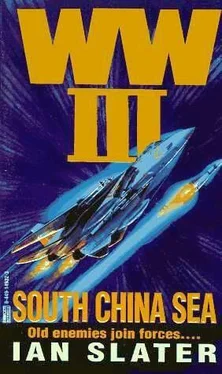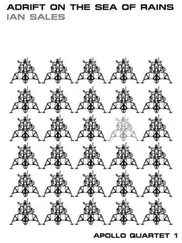The admiral turned to a wall chart on naval growth in the Pacific. “China makes no bones about the fact that she wants blue water capability. She’s been hankering for it for a long time. She hasn’t got it yet, but in our perceived absence she means to have it as quickly as possible. SIGINT tells us that the Chinese plan to be ready with carriers, the new Luhu guided missile destroyers, and the new Russian Kilo derivative submarines by 2007. That’s not far away, Mr. President. We had hoped we might continue to cut the U.S. deficit by selling them some of our used carriers and other warships. Problem is, Russia is offering bargain-basement prices in China and Southeast Asia. Most importantly, potential buyers know the Russians can establish ‘through-life’ support and maintenance, because the Russians, ironically, keep building them while we’re cutting back and are unable to promise any kind of ‘through-life’ warranty.”
The admiral’s assistant flicked over the China chart to one of Japan. “A further measure of these Asian countries’ independence is the fact that the Japanese Defense Force, for example, now has the best ship-carrying air defense system.”
“In Southeast Asia?” the President interjected.
“No, sir,” the CNO replied. Maybe he was getting through at last, he thought. “The best in the world.”
“Could I cut in here?” asked David Noyer, director of the CIA.
“Please,” the President invited.
“Mr. President, in addition to what the admiral says, the agency is convinced that Japan has a three- to four-month capability to develop nuclear bombs.”
The President tried not to show any surprise, but his assistant, Bruce Ellman, spotted the telltale push of the leather-bound blotter atop the desk, where he was glancing at the cable from the SOSUS posts.
“In twelve to sixteen weeks,” the President said, “you’re telling me Japan could field nuclear bombs?”
“Yes,” Noyer replied. “In November ‘ninety-three they began importing over twenty tons of plutonium for their fast breeder reactors. At least that’s what they told us it was for. They already had over five hundred pounds of the stuff by the late eighties.”
“That shipment from France?” Admiral Reese put in.
“Correct,” Noyer confirmed.
Reese shook his head disgustedly. “Those damn Frenchmen’d sell arsenic to their mothers if they could.”
The President ignored George Reese’s well-known Franco-phobia, which stemmed from France’s refusal to let the U.S. Air Force fly through French airspace en route to bomb Khadafy in Libya years before.
“And,” Reese added, “more to the point, I’ll warrant that our intelligence agency isn’t the only one that knows of the Japanese capabilities.” He looked at Noyer. “No offense to the CIA, David.”
“None taken, Admiral,” Noyer assured him. “You’ve hit the proverbial nail on the head. Ever since Shinseito — the conservative New Life party in Japan — gained power over the socialists, they’ve helped push the Liberal Democratic party majority in support of a more active role for the Japanese Defense Force.”
“The Japanese offense force,” the President posited.
“Well, whatever they want to call it, Mr. President, I don’t think you can fault them, with that maniac North Korean within nuclear- and Scud-hitting distance of Tokyo.”
“No,” the President agreed, “you can’t, but if I get your drift, gentlemen, you’re telling me that because of our lack of a firm foreign policy — compliments of the previous administration — Japan as well as the Southeast Asian countries we’ve mentioned in the area feel more vulnerable because of our withdrawal from the Philippine bases. So they’re seeking the capacity to defend themselves should North Korea or anyone else start a war. They also see Japan rearming in the face of increased Russian presence in the East China Sea, and know North Korea probably has nuclear weapons. In any case, I seriously doubt that their Southeast Asian neighbors’ intelligence agencies don’t know about Japan’s nuclear ability too — and that alone would frighten the bejaysus out of any of Japan’s neighbors.”
Noyer and Reese nodded in unison, with Reese turning to the next info chart “Exactly. Malaysia, Indonesia, Philippines, Vietnam, China were all attacked by Japan in World War Two when her oil and raw materials ran out after FDR’s embargo. And if this Spratly Islands issue blows up and there’s a shooting gallery in and around the trade routes from the Middle East that pass through there, then Japan couldn’t last very long without acquiring new oil and raw materials that come through to her via the South China Sea.”
“So now,” the President said, “we have North Korea, South Korea, Japan, Taiwan, Thailand, Malaysia, Singapore, and Indonesia all rearming as fast as they can.”
“Yes, sir. Even the Aussies and New Zealanders are upgrading.”
“Why?”
“They’ve got a defense pact with Malaysia, Singapore, and Brunei, but Indonesia’s presence in West Irian, or what used to be called West New Guinea, is the Australians’ big worry. You think we have human rights problems with China vis-à-vis our trade and most-favored-nation clause. You should look at Australia’s Joint Intelligence Bureau report on what the Indonesians are up to in West Irian and Timor. It’s take the villagers out and shoot them on the spot. Besides, Indonesia’s population is 175 million, Australia’s is barely fifteen, and it’s only a half-hour hop from New Guinea to Australia. All the Aussies have up there in the north are crocodiles and Darwin. Most Australians are crammed into the far southeast comer.
“We’ve got some damned important defense radar and communications sites up there,” Reese concluded.
“They wouldn’t last long,” Noyer said, “if the Indonesians really wanted to get them. But I’m not concerned about the Aussies for the moment. It’s all this strutting in the Southeast Asian states over the Spratlys that’s got me worried.”
“Yes,” the President said, cutting in. “We’ve got to run this Spratly incident to ground — if you’ll pardon the mixed metaphor — before the accusations start flying, giving every one of those countries the national justification for rearming. Nothing like a nice little war, gentlemen, to boost the ruling parties’ fortunes at home.”
“Good point,” Noyer conceded. “We’ve got our finger on the pulse with regards to that one — our military attaches, et cetera — but it’s difficult to see the whole picture at any one time. Too many players.”
“Too many or not,” the President continued, “we’ve got to get on top of this thing. And I want the American public informed because if, God forbid, I have to send American boys over there, I don’t want it done on some damned flimsy bit of evidence.”
Noyer sighed. “It’ll be difficult. I mean, the American public isn’t used to thinking about Southeast Asia. Now, if it was Europe—”
“Well, they’d better start,” the President said unequivocally, “because we all know, gentlemen, we’re on the threshold of the Pacific century. Europe’s only going to constitute six and a half percent of the world’s population, and in any case it’s going to have to fix its own business. But if we’re to look after our business — and I don’t want to put this thing just in terms of dollars and cents, but the dollars and cents are there nevertheless — we need those Asian trade routes more than most, and we need them open all the time.”
“Agreed,” Noyer said. “I think we had better start some position papers for selected congressmen.”
“Not for selected congressmen, David, for all congressmen. That’s another thing I don’t want going on around here. If it leaks out that we’re only giving the information to certain congressmen, it’ll look like what it is — selective feeding. I don’t want any part of that. Not in this situation. I agree, you’re right, the foreign policy of this country’s been a basket case due to the previous administration. But now’s the time — and I hope to God it isn’t too late — that we can send out the message that we do not want, nor will we tolerate, another Yugoslavia in Asia.”
Читать дальше












